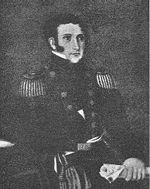- Manuel Dorrego
-
Manuel Dorrego (11 June 1787 – 13 December 1828) was an Argentine statesman and soldier. He was governor of Buenos Aires in 1820, and then again from 1827 to 1828.
Dorrego stepped into the political void created after the resignation of the first President of Argentina, the liberal Bernardino Rivadavia. Dorrego was a firm supporter of Federalism, and this consequently led to his execution at the hands of Juan Lavalle. The conservative caudillo Juan Manuel de Rosas became his federalist successor, and ruled Argentina from 1829 to 1852.
He was buried in La Recoleta Cemetery in Buenos Aires.
See also
- Argentine Civil War
Preceded by
Vicente López y PlanesGovernor of Buenos Aires Province
1827-1828Succeeded by
Juan Manuel de RosasHeads of state of Argentina May Revolution and Independence War Period
up to Asamblea del Año XIII (1810–1814)Supreme Directors of the United Provinces
of the Río de la Plata (1814–1820)Unitarian Republic – First Presidential Government (1826–1827) Pacto Federal and Argentine Confederation (1827–1862) National Organization – Argentine Republic (1862–1880) Generation of '80 – Oligarchic Republic (1880–1916) First Radical Civic Union terms,
after Universal (Male) Suffrage (1916–1930)Infamous Decade (1930–1943) Revolution of '43 military dictatorships (1943–1946) First Peronist terms (1946–1955) Revolución Libertadora military dictatorships (1955–1958) Fragile civilian governments – Proscription of Peronism (1958–1966) Revolución Argentina military dictatorships (1966–1973) Return of Perón (1973–1976) National Reorganization Process military dictatorships (1976–1983) Return to Democracy (1983–present) Argentine Civil War (1814-1876) Parties
involved
(leaders)Federalists (José Gervasio Artigas · Mariano Vera · Estanislao López · Francisco Ramírez · Juan Bautista Bustos · Manuel Dorrego · Facundo Quiroga · Alejandro Heredia · Pascual Echagüe · Juan Manuel de Rosas · Justo José de Urquiza · Ricardo López Jordán · Felipe Varela · Chacho Peñaloza)
Unitarians (Carlos María de Alvear · Juan Martín de Pueyrredón · José Rondeau · Bernardino Rivadavia · Juan Lavalle · José María Paz · Juan Esteban Pedernera · Gregorio Aráoz de Lamadrid · Pedro Ferré · Domingo Faustino Sarmiento)Battles Cepeda (1820) · Navarro (1828) · San Roque (1829) · Márquez Bridge (1829) · La Tablada (1829) · Oncativo (1830) · Sauce Grande (1840) · Famaillá (1841) · Caaguazú (1841) · Laguna Limpia (1846) · Vuelta de Obligado (1846) · Caseros (1852) · Don Gonzalo (1873)Treaties Pilar (1820) · Benegas (1820) · Quadrilateral (1822) · Cañuelas Pact (1829) · Federal Pact (1831) · Protocol of Palermo (1852) · San Nicolás (1852) · Pact of San José de Flores (1859)See also United Provinces of the Río de la Plata · League of the Free Peoples · Arequito Revolt · Revolution of the Restorers · Federal League · Unitarian League · Argentine Confederation · Uruguayan Civil War · State of Buenos Aires · Argentine Constitution of 1853
This article about the history of Argentina is a stub. You can help Wikipedia by expanding it.

